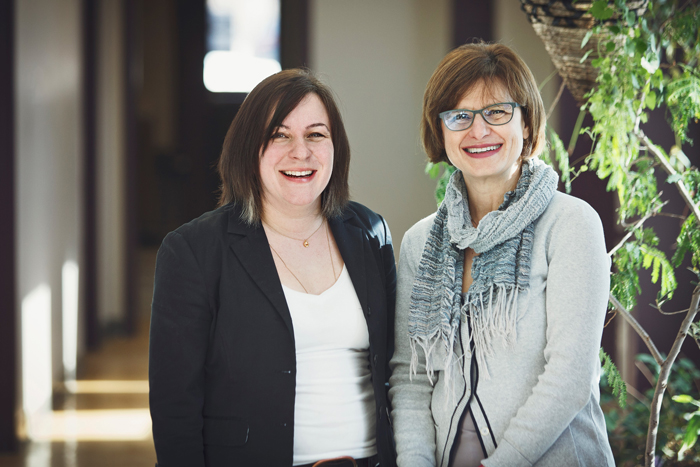This project allows at-risk students to experience reading and writing naturally, while doing something they love.
Related pages
- A partnership to promote early childhood literacy
- Filling bellies to keep kids in school
- Strong communities working to keep girls in school
- Supporting students who re-engage with school
- Understanding youth to smooth their transition to high school
- When schools and the business sector work together, youth benefit
- Words that resonate for a school and its community
The “Discover Reading Through Your Passions” project at Place Cartier in Beaconsfield
Creating magical moments for students at risk of dropping out
Last year, the Lester B. Pearson School Board in Montreal’s West Island and the Institut des troubles d’apprentissage (ITA) — an organization dedicated to helping people with learning disabilities fulfill their potential – joined forces on a new literacy project for students at Place Cartier Adult Education Centre in Beaconsfield.
 Shannahn McInnis and Myriam Rabbat (Photo : François Couture)
Shannahn McInnis and Myriam Rabbat (Photo : François Couture)
The centre has two campuses in the West Island that accommodate about 1,600 students aged 16 to 90 (!) enrolled in social integration or high school diploma programs, taking English and French language courses, finishing pre-requisites for vocational training programs, or earning credits to enter CEGEP or university. And this is where the “Discover Reading Through Your Passions” program, which helps students improve their reading and writing skills, came about.
« If you also experience reading and writing naturally, while doing something you love, it will enhance learning. »
“The overarching idea behind the project is to create ‘magical moments’ for students at risk of dropping out,” explains Shannahn McInnis, an education consultant for the ITA and the project coordinator. “Language and communication courses are fine for developing an ability to understand how to use written information, but if you also experience reading and writing naturally, while doing something you love, it will enhance learning.”
McInnis first conducted a survey of the student body to get a sense of what they were passionate about – things like rap and hip hop, basketball, gaming, and even cooking! She then used these interests to build a program of activities that incorporate a literacy component. For example, in cooking, students work on reading and writing by examining and preparing recipes; in theatre, they study and memorize lines.
“We get to witness some really magical moments! For example, one young woman wrote a rap during a workshop and was blown away and moved to hear how powerful and truly ‘rap’ it was when backed with instruments that paid tribute to her ethnic origins. In another workshop, students formed a choir to back a classmate who was singing a solo; when one student wasn’t singing for some reason, another chorister turned to her and said hey, sing up and support her, OK? She should get her magical moment too! This kind of instant leadership happened without the facilitator having to do anything,” relates McInnis.
“We soon realized that if the activity interfered with students’ lives outside of school, it wouldn’t work.”
The activities were initially offered outside of the regular school schedule, but they attracted few people. “We soon realized that if the activity interfered with students’ lives outside of school, it wouldn’t work,” notes Myriam Rabbat, principal of Place Cartier. “Attendance isn’t mandatory here. Even if we give students a spare period for social, cultural, or sports activities, that doesn’t mean they’ll take advantage of it. These are adults; they have lives outside of school – lives that are sometimes very complicated. So we knew we’d have to adjust our aim to make the program work.”
Upon reflection, McInnis and Rabbat concluded that they would have to call upon the centre’s teachers; the “magical moments” in literacy would henceforth happen during class and would be related to the subject matter to be covered during the school year. “By getting the students hooked during class hours, it’s easier to convince them to continue the magical moment during lunch. For example, they might work with a literary improv specialist to write a spoken word text during their English class, and then have a chance to record it with a sound technician after class. It turned out to be a winning formula,” explains McInnis.
“Projects like this one help to create a better, more stimulating, and more structured environment for them – and society as a whole benefits from that”
Surprisingly, there are few projects like this for adults in Québec – and yet there’s a desperate need for them. As Myriam Rabbat points out, “we have many students with mental health problems here in particular, which is why they can’t function in other schools. Many of these students don’t have significant adults in their lives, which means that in a sense, the people at Place Cartier become their family. Projects like this one help to create a better, more stimulating, and more structured environment for them – and society as a whole benefits from that. Since we don’t have the resources or the expertise here to develop and pilot projects like this, we are so happy and fortunate to be able to work with Shannahn and the people from the ITA, who really take the success of our students to heart.”
“The students’ rate of participation and enthusiasm prove that we’re on the right track.”
The program’s first year had many magical moments, and there should be many more next year. “This year we laid the foundations,” states McInnis. “Next year we’ll be even better. It’s still too early to measure the project’s long-term effects, but the students’ rate of participation and enthusiasm prove that we’re on the right track. I’m free to try things out and make mistakes here; no one acts like they have a monopoly on the truth, and they’re open to change. We make a great team, and Myriam treats me like an honorary Place Cartier staff member. That’s the key to building this wonderful project.
_ June 2018
Over the coming months, Montreal Hooked on School will publish a series of articles about various fruitful partnerships between the education sector and community stakeholders promoting youth success.
We asked writer and photographer François Couture to go and meet the people involved in these partnerships and tell their stories.





